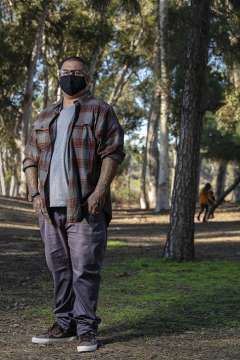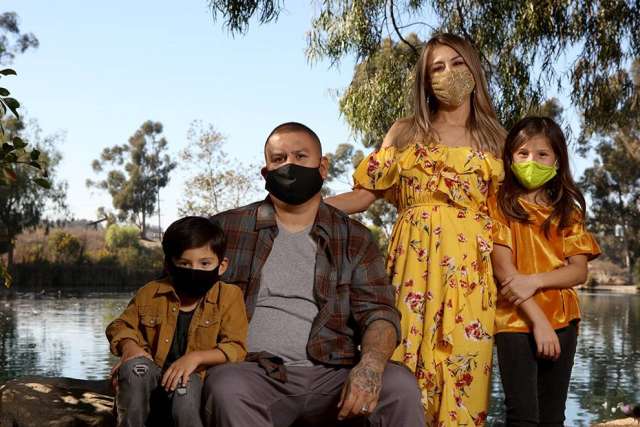Ruben Salazar had never taken a sick day. An active 43-year-old father of two, he regularly worked out, took his kids to the park and stayed busy with his job at a health-supplement company.
Then the pandemic hit and everything changed.
Salazar contracted COVID-19 in early June and slowly saw his health and the life he knew fall apart. He was hospitalized and intubated — even comatose for several days — and though he recovered from the acute aspects of the virus in July, he’s still experiencing myriad health concerns.
“It was a bad experience for me because I was once not a believer. I was like, ‘It’s a hoax. It’s the government. It’s this. It’s that,’” Salazar says. “For me to be infected like that, it changed my mind dramatically. Coming out of the ICU, it seemed like the old Ruben died and a new Ruben was born.”

The new Ruben came home with diagnoses of hypertension and diabetes. A light workout now leaves him fatigued. He rarely has the energy to play with his kids and often finds himself short of breath. He has to wear eyeglasses he never needed before.
Once known for his easygoing nature, Salazar is dealing with mood issues for the first time: anxiety and a quick temper.
“I feel like it’s the flu on steroids,” he says of his COVID-19 experience. “And whatever was in your system, it attacks it and brings it out.”
Salazar has yet to return to work, but he’s getting treatment for his ongoing symptoms at UCLA Health’s new Post-ICU Recovery Clinic, at 200 UCLA Medical Center Plaza. Led by pulmonologists and critical-care physicians Kristin Schwab, MD, and Nida Qadir, MD, the clinic opened in February to help patients transition from the intensive care unit to home recovery.
“They get such intensive care in the hospital and have this near-death experience, and then they’re discharged — usually with many new diagnoses, including new pulmonary conditions, significant weakness, cognitive dysfunction and the risk of other psychiatric conditions — and are often left to fend for themselves at home,” Dr. Schwab says. “We really envision this clinic as a way to bridge them back to their primary care doctor and their normal life.”
While the clinic is available for all patients discharged from the ICU, it quickly became a de facto COVID-19 recovery clinic in March.
“Our clinic population has been almost entirely COVID survivors lately,” Dr. Schwab says. “So it’s been a very useful clinic to help this new demand.”
Many of the patients being treated in the Post-ICU Recovery Clinic are like Salazar — healthy and without medical issues before coming down with COVID-19 and ending up in intensive care.
The clinic has a multidisciplinary staff of specialists, Dr. Schwab says. Beyond critical care doctors, the clinic’s team includes a respiratory therapist, an occupational therapist, a physical therapist and a social worker. Together, they’re able to address the physical weakness that’s likely after a hospital stay, the anxiety and emotional issues that can result from a near-death experience, as well as the respiratory concerns common among COVID-19 survivors.
Patients are responding well to the holistic approach, she says: “They’re saying it makes them feel that every issue was addressed.”
Objectively, too, far fewer patients being cared for at the clinic are returning to the hospital, compared to the 20% to 30% readmission rate often cited for patients after leaving the ICU.
“The fact that we’ve only had one (out of 30) patient who needed readmission so far has been really impressive and suggests this is a valuable clinic to help not only each individual patient, but also the hospital system,” Dr. Schwab says.
Though Salazar is back in the care of his primary physician, the new clinic is playing a key role in his ongoing recovery.
“I’m trying to build myself back, and that’s why I talk to Dr. Schwab,” he says. “Because she gives me the best information I probably could get.”
The Los Angeles resident turns to the Post-ICU Recovery Clinic with his questions about lingering symptoms such as anxiety, tightness in his chest and shortness of breath. He’s also talking to researchers affiliated with the clinic who are studying COVID-19 survivors.
For Dr. Schwab, opening the post-ICU clinic just ahead of a pandemic has proven both fortuitous and fascinating as she finds herself at the forefront of treating a new disease.
“Improving care for ICU survivors has been a passion and the main reason we launched the clinic,” she says. “We never expected that the timing of the launch would coincide with a national pandemic, when ICU recovery is at the forefront of everyone’s attention.”
Dr. Schwab has also become the go-to pulmonologist for anyone diagnosed with the virus who wants to see a lung specialist, whether the patient was in the ICU or not.
In that capacity, she’s seen firsthand how some people recover from COVID-19 and resume their normal activities within a few weeks while others are plagued for months by prolonged symptoms. Most patients, she says, don’t end up with the “long-hauler” array of problems — ongoing shortness of breath, fatigue and the memory issues and mental sluggishness known as “brain fog.” And among those who do, not all were hospitalized.
“It suggests there’s a different phenotype that puts you at risk for having long-term symptoms and that’s not always correlated with just how severely ill you were to begin with,” Dr. Schwab says.
Andrew Levine, PhD, says the “brain fog” and other neurological symptoms associated with COVID-19 may be due to post-traumatic stress. He recently coauthored a paper that found similar symptoms in survivors of SARS and MERS, two previous coronavirus infections.
More studies are needed to determine whether the COVID-19 virus itself causes neurological problems or if patients’ cognitive issues are the result of post-traumatic stress disorder (PTSD), says Dr. Levine, a clinical professor of neurology at the David Geffen School of Medicine at UCLA. Symptoms of PTSD include trouble sleeping, difficulty concentrating and memory and mood changes.
“Individuals who suffer COVID-19 are often put in the ICU, put on mechanical ventilators and experience delirium,” Dr. Levine says. “Those conditions and treatments themselves, even outside the context of COVID, can lead to post-traumatic stress symptoms and post-traumatic stress disorder.”
Seeing news coverage about the cognitive problems that can sometimes result from COVID-19 may contribute to those issues arising in people who recover from the virus, he says.
“That anxiety can exacerbate the symptoms,” Dr. Levine says. “There’s certainly a kind of neuroses that arises from everyone’s knowledge about this illness and all the reports of long-haulers having lasting symptoms.”
For Salazar, who had never been hospitalized prior to his experience with COVID-19, the delirium and “visions” he experienced while comatose led him to feel that something profound had changed within.
“I don’t know if it was a past life or something, but I woke up emotional,” he says. “And it could have been the drugs or whatever, but to me, when I was under, it seemed like forever, but it was only four days.”
His ongoing anxiety stems from a fear of spreading the disease, he says, even though doctors say he’s no longer contagious. His wife, who insisted in June he go to the hospital after 12 days of his condition worsening at home, is anxious, too.
“My wife is concerned about the long term — like what’s going to happen five years from now? Ten years from now?” Salazar says. “I don’t think they really know, so it’s just going to be a ride I’m going on.”
To learn more about the Post-ICU Recovery Clinic, click here.



